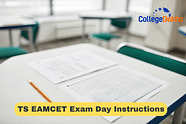Knowing the KCET Physics important topics aids in better scores. Gravitation, Motion in a Straight Line, Oscillations are some of the KCET 2024 Important Topics for Physics. Check chapter-wise topics in this article.

KCET 2024 Important Topics for Physics: As KCET Physics is an important part of the syllabus, candidates should follow a vigorous preparation strategy. As per previous years' data, Gravitation, Motion in a Straight Line, Oscillations, and Thermodynamics are some of the KCET 2024 Important Topics for Physics.
LATEST -
- KCET 2024 Important OMR Instructions
- KCET Unofficial Answer Key 2024: PDF Download for All Sets and Subjects
- KCET Biology Answer Key 2024: All sets of questions with answer key solutions.
- Expected Rank for 165 to 175 Marks in KCET 2024 with 2nd PUC Weightage
- Expected Rank for 155 to 164 Marks in KCET 2024 with 2nd PUC Marks Weightage
Preparing for physics subject for the KCET 2024 exam includes completing the KCET 2024 physics syllabus, practicing KCET previous year question papers, and attempting mock tests as many as possible before the exam. To assist candidates we have outlined the KCET 2024 physics important topics which will help them focus in a particular direction. Furthermore, it is equally important for candidates to have a robust preparation strategy for physics and focus on some of the important topics having high weightage in the first place. In this article, we have mentioned KCET 2024 important topics for physics along with the KCET syllabus 2024 of Physics.
Also Check,
KCET 2024 Physics Important Topics
Let us help you run through all the topics that will form the basis of the KCET syllabus 2024, Physics paper first. The following table will provide you with all the details:
Chapters | Weightage |
|---|---|
Gravitation | 8 |
Motion in a Straight Line | 7 |
Oscillations | 7 |
Thermodynamics | 7 |
Mechanical Properties of Solids | 4 |
Mechanical Properties of Fluids | 4 |
Kinetic Theory | 4 |
Units and Measurement | 3 |
Physical-world | 2 |
Magnetism and Matter | 7 |
Alternating Current | 7 |
Electromagnetic Induction | 6 |
Nuclei | 6 |
Atoms | 5 |
Communication Systems | 3 |
Electromagnetic Waves | 2 |
KCET 2024 Physics Syllabus
Now let us talk in detail about the sub-topics of the aforementioned topics from which the 60 questions will be framed:
Name of Topic | Sub-topics | Important Topics |
|---|---|---|
Units and Measurement | Accuracy and Precision of Measuring Instruments, Mass and Time Measurements, Length, Fundamental and Derived Units, SI Units, System of Units, Unit of Measurement, Dimensions of Physical Quantities - Dimensional Analysis and its applications, etc |
|
Physical World |
|
|
Gravitation | Earth Satellites, Derivation of Gravitational Potential Energy (Gravitational Potential Energy), Derivation of Relation Between g and G (Acceleration due to Gravity), Kepler’s Laws of Planetary Motion |
|
Motion in a Straight Line | Elementary Concepts of Differentiation and Integration for Describing Motion, Uniformly Accelerated Motion, Uniform & Non-Uniform Motion, Definitions of Average Velocity and Average Speed, Definitions of Path Length and Displacement |
|
Mechanical Properties of Fluids | Surface Tension, Reynold’s Number, Viscosity, Bernoulli’s Principle, Streamline Flow, Pascal’s Law - Statement & its Applications, Gauge Pressure, Pressure etc |
|
Mechanical Properties of Solids | Bulk Modulus, Young’s Modulus (Elastic Moduli), Stress-Strain Curve, Hooke’s Law, Stress-Strain, Elastic Behaviour of Solids, Elasticity and Plasticity |
|
Kinetic Theory | Concepts of Mean of Free Path, Diatomic & Polyatomic Gases, Law of Equipartition of Energy, Degrees of Freedom, Kinetic Theory of an Ideal Gas, Equation of State of a Perfect Gas |
|
Thermodynamics | Reversible and Irreversible Processes, Refrigerators, Heat Engines, Adiabatic Processes, Laws of Thermodynamics, Thermal Equilibrium |
|
Oscillations | Oscillations due to a Spring, Simple Harmonic Motion, Periodic Functions, Displacement as a Function of Time, Periodic and Oscillatory Motion |
|
Electromagnetic Induction | AC Generator, Self-Inductance and Mutual Inductance (Inductance), Lenz’s Law, Experiments of Faraday and Henry |
|
Magnetism and Matter | Definition of Retentivity and Coercivity, Hysteresis Loop, Hysteresis, Magnetic Properties of Materials, Earth’s Magnetic Field and its Elements, Gauss Law in Magnetism, Bar Magnet (Properties of Magnetic Field Lines) |
|
Electromagnetic Waves | Electromagnetic Spectrum, Electromagnetic Waves, Expression for Ampere-Maxwell Law, Expression for Displacement Current, Need for Displacement Current, Displacement Current |
|
Alternating Current | LC Oscillations, Mention of Expression for Power in AC Circuit, AC Voltage Applied to Series LCR Circuit, AC Voltage Applied to an Inductor, AC Voltage Applied to a Resistor, Motion of Expression for Instantaneous, Peak, and RMS Values of Alternating Current and Voltage |
|
Nuclei | Radioactivity, Nuclear Fusion, and Nuclear Fission, Explanation of Mass Defect and Binding Energy, Isobars and Isotones, Isotopes, Definition of Atomic Mass Unit |
|
Atoms | Derivation of Energy of Electron in Stationary States of Hydrogen Atom, Bohr’s Model of Hydrogen Atom, Atomic Spectra, Rutherford’s Model of Atom, Schematic Diagram of Geiger-Marsden Experiment, Alpha Particle Scattering |
|
Communication Systems | Propagation of Electromagnetic Waves, Free Space and Optical Fibres, Bandwith of Transmission Medium for Coaxial Cable, Bandwith, Range, Amplification, Attenuation, Receiver, Transmitter, Noise, Signal, Transducer, Block Diagram of Generalised Communication System |
|
KCET Physics Topics from PUC I
The Physics topics from the class 11th or PUC 1st Year included in the KCET syllabus 2024 have been tabulated below.
KCET Physics Chapters | PUC I Topics |
|---|---|
Motion in a straight line |
|
Physical World |
|
Units and Measurements |
|
Laws of Motion |
|
Motion in a Plane |
|
Work, Energy, and Power |
|
System of Particles and Rotational Motion |
|
Gravitation |
|
Mechanical Properties of Solids |
|
Thermal properties matter |
|
Mechanical Properties Fluid |
|
Kinetic Theory |
|
Thermodynamics |
|
Waves |
|
Oscillation |
|
KCET Physics Topics from PUC II
The Physics topics from the class 12th or PUC 2nd Year included in the KCET syllabus 2024 have been tabulated below.
KCET Physics Chapters | PUC II Topics |
|---|---|
Current Electricity |
|
Electric charges and fields |
|
Magnetism and Matter |
|
Electrostatic Potential and Capacitance |
|
Moving Charges and Magnetism |
|
Ray Optics and Optical Instruments |
|
Electromagnetic Induction |
|
Alternating Current |
|
Electromagnetic Waves |
|
Atoms |
|
Wave Optics |
|
Dual Nature of radiation and matter |
|
Semiconductor Electronics: Devices, Materials, and Simple Circuits |
|
Nuclei |
|
KCET 2024 Physics Preparation Guide
Candidates should review the following suggestions for preparation before sitting the KCET 2024. The following are some preparation ideas for the KCET Physics Syllabus 2024:
Understand the Syllabus
- Candidates must thoroughly study the syllabus to pass the KCET 2024 exam and avoid wasting time and effort.
- Updates to the KCET Syllabus will be notified to candidates as soon as possible.
- As per the revised KCET physics syllabus, there are some topics that have been removed. These include the Reflection of Light from Spherical Mirrors, Rewster’s Law, Cyclotron, Wattless current, and Carbon Resistors.
Know the Exam Pattern
Physics differs from Mathematics and Biology in that it includes numerical, theoretical, and diagrammatic elements. all in one place As a result, students must be familiar with the KCET exam pattern 2024, kind of questions, marking scheme, exam pattern, and duration before taking the entrance exam.
Follow a Topic- wise Schedule
To pass the KCET 2024 exam, candidates must stick to a strict schedule. To succeed in the exam, the timeline should be practical and followed regularly.Also read: Best Books for KCET Preparation 2024
Practice Mock Tests/Sample Papers Regularly
The physics session consists of 60 questions to be completed in 70 minutes, including time to fill out details in the OMR sheets. One minute is allotted to each question. As a result, the candidate must be fast with numbers and have basic time management abilities. There are no shortcuts to learning these abilities; a candidate's speed can only be increased by practice, and the ability to manage time can only be gained through mock tests or KCET 2024 Sample papers.Related Links on KCET 2024
The students can click on the following links in the table provided below for more details related to the KCET 2024 exam:
| KCET 2024 Chemistry Syllabus | KCET 2024 Mathematics Syllabus |
|---|---|
| List of Colleges for above 1,00,000 Rank in KCET for B.Tech Admission 2024 | How to Get Admission in B.Tech without KCET 2024 Score? |

















Similar Articles
AP EAPCET (EAMCET) 2024 BTech EEE Cutoff - Check Closing Ranks Here
Tamil Nadu B.Tech Admissions 2024 (TNEA): Dates, Counselling, Seat Allotment, Colleges
AP EAPCET (EAMCET) 2024 BTech ECE Cutoff- Check Closing Ranks Here
AP EAPCET (EAMCET) B.Tech Mechanical Engineering Cutoff - Check Closing Ranks Here
AP EAPCET (EAMCET) B.Tech Civil Engineering Cutoff - Check Closing Ranks Here
What is a Good Score & Rank in TS EAMCET 2024?